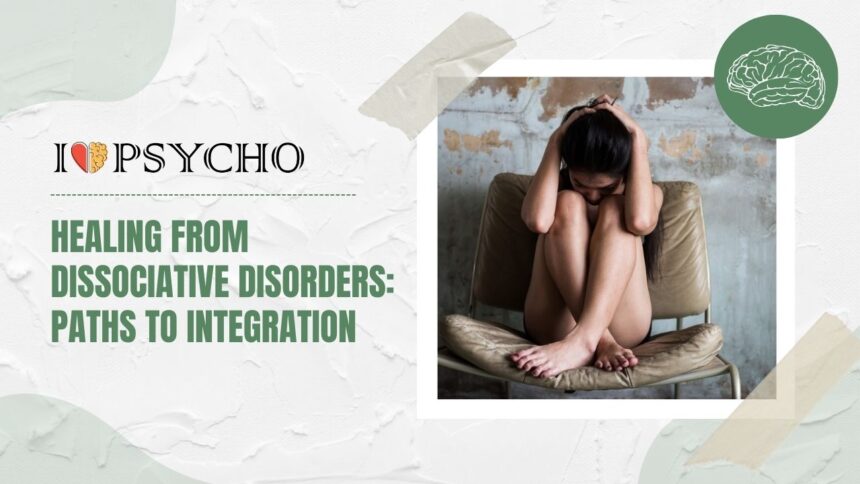Are you feeling disconnected from yourself or struggling to piece together your identity? Dissociative disorders can create a rift in our sense of self, making it challenging to navigate daily life. But there is hope! In this blog post, we will explore the paths to integration and healing for those grappling with dissociation. Let’s delve into understanding these disorders, therapeutic approaches, self-care strategies, and the importance of integration in reclaiming your sense of wholeness.
Understanding Dissociative Disorders
Dissociative disorders are complex mental health conditions that involve a disconnection between thoughts, identity, consciousness, and memory. Individuals with dissociation may feel detached from themselves or their surroundings, like they’re observing life from outside their body.
These disorders often stem from trauma or overwhelming stress, serving as a coping mechanism to protect the individual from experiencing intense emotions or memories. Dissociation can manifest in various ways, such as amnesia for certain periods of time, feeling disconnected from one’s own body (depersonalization), or encountering different identities within oneself (dissociative identity disorder).
Understanding dissociative disorders requires recognizing the diverse symptoms and how they impact an individual’s daily functioning. It is essential to approach these conditions with empathy and a willingness to explore the underlying factors contributing to dissociation.
Types of Dissociative Disorders
Dissociative disorders encompass a range of conditions that involve disruptions in a person’s memory, identity, consciousness, or perception of the world. One common type is Dissociative Identity Disorder (DID), previously known as multiple personality disorder. Individuals with DID may have two or more distinct identities or personality states.
Another type is Depersonalization-Derealization Disorder, where individuals feel detached from their thoughts, feelings, body or surroundings. This can lead to feeling like an outside observer of one’s own thoughts and actions. Additionally, there’s Dissociative Amnesia where individuals experience memory loss that goes beyond normal forgetfulness.
Other Specified Dissociative Disorder includes dissociative symptoms that don’t fit the criteria for other specific diagnoses but still cause distress or impairment in daily functioning. Each type presents its unique challenges and manifestations requiring tailored approaches for treatment and healing.
Causes and Triggers of Dissociation
Dissociative disorders can stem from a variety of causes and triggers, often rooted in past traumatic experiences. These disorders may develop as a coping mechanism to protect the individual from overwhelming emotions or situations.
Childhood trauma, such as abuse or neglect, is commonly linked to dissociation. The mind creates barriers to shield itself from painful memories, leading to detachment from reality as a defense mechanism.
Sudden life changes or stressors can also trigger dissociative episodes. High levels of stress can overwhelm an individual’s ability to cope effectively, prompting the mind to disconnect from reality.
Genetic factors and neurological abnormalities may play a role in predisposing individuals to dissociative symptoms. Research suggests that certain genetic markers could increase susceptibility to developing dissociative disorders under stressful conditions.
Understanding the complex interplay of these causes and triggers is crucial in addressing and treating dissociation effectively. By delving into these underlying factors, therapists can tailor interventions that promote healing and integration for those struggling with dissociative disorders.
Therapeutic Approaches for Healing
Therapeutic approaches for healing dissociative disorders involve a variety of techniques tailored to the individual’s needs. Talk therapy, such as cognitive-behavioral therapy (CBT) or dialectical behavior therapy (DBT), can help clients identify and change negative thought patterns and behaviors. Eye movement desensitization and reprocessing (EMDR) is another effective method that focuses on processing traumatic memories.
Body-based therapies like somatic experiencing or yoga can help individuals reconnect with their bodies and release stored trauma. Art therapy provides a creative outlet for self-expression when words may be difficult to find. Group therapy offers a supportive environment where individuals can share experiences with others who understand.
Medication may also be prescribed to manage symptoms like anxiety or depression. Finding the right combination of therapies often involves trial-and-error, but with persistence and support, progress is possible in the journey towards healing from dissociative disorders.
Self-Care and Coping Strategies for Those with Dissociative Disorders
Living with dissociative disorders can present unique challenges that require special attention to self-care and coping strategies. It’s important for individuals struggling with these conditions to prioritize their mental and emotional well-being.
Engaging in activities that promote relaxation, such as meditation or yoga, can help reduce stress levels and increase mindfulness. Creating a safe and calm environment at home is also crucial for managing symptoms of dissociation.
Developing a routine that includes regular exercise, healthy eating habits, and sufficient rest can contribute to overall stability and improved mood. Setting boundaries with others and learning how to communicate your needs effectively are essential skills for maintaining healthy relationships.
Seeking support from trusted friends, family members, or mental health professionals can provide valuable guidance and validation during difficult times. Remember, it’s okay to ask for help when needed – you don’t have to navigate this journey alone.
Traditional Approaches to Treatment
Traditional approaches to treating dissociative disorders often involve a combination of psychotherapy and medication. Psychotherapy, such as cognitive-behavioral therapy (CBT) or dialectical behavior therapy (DBT), aims to help individuals understand their thoughts and behaviors. This can assist in managing symptoms and improving coping strategies.
Medication, like antidepressants or anti-anxiety drugs, may be prescribed by a psychiatrist to alleviate specific symptoms associated with dissociation. These traditional treatment methods are commonly used in conjunction with each other to provide comprehensive care for individuals struggling with dissociative disorders.
In addition to therapy and medication, support groups can also play a vital role in traditional treatment approaches. Engaging with others who have similar experiences can offer validation, understanding, and encouragement on the path towards healing from dissociation.
Alternative Therapies for Healing
When it comes to healing from dissociative disorders, traditional therapies like cognitive-behavioral therapy and medication may not always be the perfect fit for everyone. This is where alternative therapies come into play, offering unique approaches that can complement or even replace conventional treatments.
One alternative therapy gaining popularity in treating dissociation is Eye Movement Desensitization and Reprocessing (EMDR). Through guided eye movements, this technique helps individuals process traumatic memories and emotions in a safe environment.
Another option is art therapy, where patients can express themselves creatively through various art forms. This method allows for non-verbal communication of feelings and experiences that may be difficult to put into words.
Mindfulness practices such as meditation and yoga have also shown promise in helping individuals with dissociative disorders ground themselves in the present moment, reducing anxiety and enhancing self-awareness. These holistic approaches focus on connecting the mind and body to promote overall well-being.
It’s essential to explore different alternatives under the guidance of a qualified therapist to find what works best for each individual’s unique journey towards healing.
The Importance of Integration
Integration is a crucial aspect of healing from dissociative disorders. It involves merging fragmented parts of oneself to form a cohesive identity. Integration allows individuals to make sense of their experiences, emotions, and memories in a more unified way.
By integrating different aspects of oneself, those with dissociative disorders can develop a stronger sense of self-awareness and self-acceptance. This process enables them to cultivate healthier relationships with others and navigate life’s challenges more effectively.
Embracing integration means acknowledging the complexity of one’s internal world and embracing all parts without judgment or fear. It requires patience, compassion, and dedication to the healing journey.
The importance of integration lies in creating inner harmony and wholeness for those who have experienced fragmentation due to trauma or other underlying factors. It paves the way for greater resilience, authenticity, and emotional well-being.
Strategies for Integration
Integration of dissociative parts can be a complex process requiring patience and self-compassion. One strategy is creating internal communication channels to facilitate dialogue between different parts. Journaling or art therapy can help express emotions and thoughts from various aspects of the self.
Mindfulness practices like grounding techniques can aid in staying present and connected to the body during moments of distress. Working with a therapist experienced in trauma and dissociation can provide guidance on navigating integration challenges.
Taking time for self-care activities that nurture all parts of yourself is essential for fostering wholeness. Building a support network of understanding friends, family, or online communities can offer validation and encouragement along the integration journey.
Exploring hobbies or interests that bring joy and fulfillment can help reconnect with individual passions outside of past traumas. Remember, integration is a unique process for each person, so allowing flexibility and gentleness towards oneself is key in this healing journey.
Support Systems and Resources
Support systems and resources play a crucial role in the healing journey of individuals with dissociative disorders. Having a strong support network can provide comfort, guidance, and validation during challenging times. Whether it’s friends, family members, therapists, or support groups, having people who understand and empathize with your experiences can make a significant difference.
Online forums and community platforms are valuable resources where individuals can connect with others facing similar struggles. Sharing stories and coping strategies in these spaces can foster a sense of belonging and reduce feelings of isolation.
Therapeutic professionals such as psychologists or psychiatrists specialized in dissociation bring expertise that is essential for effective treatment. Seeking out qualified professionals who are knowledgeable about dissociative disorders ensures that you receive appropriate care tailored to your specific needs.
In addition to formal therapy sessions, self-help books, podcasts, and online courses focused on trauma recovery can also complement your healing journey by providing additional tools and insights to aid in integration processes.
Remember that seeking help is not a sign of weakness but rather an act of courage towards reclaiming control over your life. Building a robust support system filled with understanding individuals empowers you to navigate the complexities of living with dissociative disorders effectively.
Conclusion
In the journey of healing from dissociative disorders, it is essential to remember that integration is a process rather than a destination. It requires patience, self-compassion, and dedication to inner work. By understanding the different types of dissociative disorders, their causes and triggers, and exploring therapeutic approaches combined with self-care strategies, individuals can embark on a path towards wholeness.
Traditional treatments like psychotherapy and medication can be effective for some individuals, while alternative therapies such as art therapy or mindfulness practices may resonate better with others. The key is finding what works best for each person’s unique needs.
The goal of integration is to create harmony within oneself by acknowledging all parts of one’s identity and experiences. This holistic approach allows individuals to reclaim their sense of self and move forward with a greater sense of authenticity and resilience.
Remember that healing is not linear – there will be ups and downs along the way. But with perseverance, support systems in place, and a commitment to growth, those struggling with dissociative disorders can find hope for a brighter future ahead.









